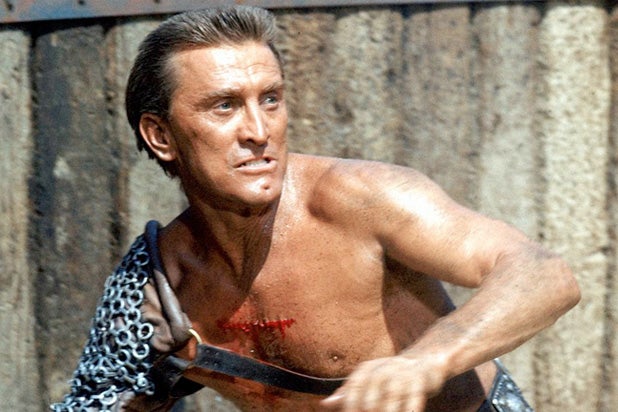KD
Kirk Douglas has just died, one of the people who helped define what it meant to be a movie star.
Born Issur Danielovitch, he grew up in New York, the child of poor Jewish immigrants from Russia. Handsome and with tremendous drive, he decided to be an actor. Even before doing his stint in WWII, he was appearing on Broadway.
After the war, he was just the type Hollywood was looking for, and before he was 30, had a leading role in The Strange Love Of Martha Ivers (1946). He continued to do notable supporting work in Out Of The Past (1947) and A Letter To Three Wives (1949). He was ready for stardom.
That came with Champion (1949), where he played a boxer, but not just any boxer--this one was a heel. That was Douglas's specialty. Not necessarily bad guys, but protagonists who had an intensity that often edged over into questionable moral character. Champion got him his first Oscar nomination.
From 1950 on he was a major player and gave a fair number of major performances. In the 50s alone that includes Young Man With A Horn, Ace In The Hole (one of my favorite Billy Wilder films), Detective Story (working with Wyler), The Big Sky (from Howard Hawks), The Bad And The Beautiful (another Oscar nomination), 20,000 Leagues Under The Sea, Lust For Life (another Oscar nomination), Gunfight At O.K. Corral, Paths Of Glory (one of Kubrick's best) and The Devil's Disciple (Kirk takes a shot at Shaw).
During this time, he became friends with Burt Lancaster, and they made a number of films together, including, of the above, Gunfight and Disciple. Also, he started Bryna Productions (named after his mother) so he could develop his own projects.
In the 1960s, though still a big star, he was starting to settle into older, less physical roles (though I wouldn't have told him that). He also went back to Broadway to take the lead in a production of One Flew Over The Cuckoo's Nest. (Later, his son would own the rights and make an Oscar-winning movie--but not let his father, a bit too old, star in it.)
Anyway, 1960 started with bang with the epic Spartacus. Behind the scenes, he removed director Anthony Mann and brought in Stanley Kubrick. More significantly, he hired screenwriter Dalton Trumbo and gave him credit, helping to end the blacklist.
Other 1960s movies: Lonely Are The Brave (which he sometimes called his personal favorite), Two Weeks In Another Town (sort of a sequel to The Bad And The Beautiful), The List Of Adrian Messenger (working with John Huston), Seven Days In May, In Harm's Way and Cast A Giant Shadow. (He also made The Brotherhood (1968), a flop that made Hollywood wonder if films about the mafia could do well.)
By the 1970s, he was in his 50s, and not the action star he'd been. Also, a new Hollywood was making a different style of film and featured a different style of acting. Douglas was still a name, but the old days of the studio era were long gone.
His films from this point on tend to be less notable (The Villain, Saturn 3), but he still did some interesting work. In particular I'm a fan of The Fury, a wild Brian De Palma action/horror film. Some thought Douglas was getting a bit long in the tooth for this sort of role, but I think he's great.
In his later years, he made less appearances and generally did character roles. Though who can forget his Chester J. Lampwick, the true creator of Itchy and Scratchy, in The Simpson's episode "The Day The Violence Died"?
In these years he also had a bit of a literary career. He published an excellent autobiography, The Ragman's Son, in 1988. It sold well, and he ended up writing ten other books, both fiction and non-fiction. My favorite is I Am Spartacus!, the story of the many problems in the making of the film.
And finally, in 1996, Hollywood righted a wrong, presenting Douglas with an honorary Oscar.
He also had some tough times. In 1991, he was seriously injured in a helicopter crash. Apparently the event made him more spiritual. Worse, in 1996, he had a stroke. But that didn't stop him from appearing at the Oscars in 2011 and the Golden Globes in 2018.
Kirk Douglas lived a long life. And no doubt his films will live on even longer.







1 Comments:
I like some of his later Westerns when he's getting too old, like Posse, A Gunfight and There Was A Crooked Man.
Post a Comment
<< Home